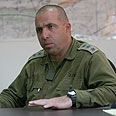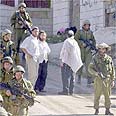
'It's complicated.' Ben Moha
Photo: Gil Yohanan

Settlers, soldiers in Hebron
Photo: AP
Hebron Brigade Commander Col. Udi Ben Moha breathed a sigh of relief when Purim, usually a time of heightened tensions in the West Bank city, passed by with only a few riots.
The fact that the anniversary of the 1994 massacre of Palestinians at the Cave of the Patriarchs is marked during the holiday, coupled with the government's recent decision to add Hebron to Israel's list of national heritage sites (along with Rachel's Tomb), raised concerns that tensions between local Jews and Palestinians would boil over and result in a particularly tumultuous holiday.
"The settlers decided they would not clash (with the Arabs), and when such a decision is reached in Hebron, we should take note of it," Ben Moha told Ynet. "The Jewish settlement (in Hebron) is in the process of maturing and sobering up. There is an understanding of the rule of law and of the negative effect the media's coverage can have on the (settlement's) image – this has become more important to them than throwing stones."
It should be noted that the interview with Ben Moha was conducted prior to Friday's fire at the city's Jewish cemetery. Residents of the Jewish settlement in the city accused the Palestinians of arson, but police have ruled out this claim.

'Balance is key.' Ben Moha in Hebron (Photo: Gil Yohanan)
According to Moha, the change in the settlers' conduct began about a year ago. "Now they are sending their children to after-school activities and enrolling the youth in camps – anything to prevent violence," he said.
"Even now, after the government decided on (temporarily freezing Jewish construction in the West Bank), we are seeing a different reaction. They seem to realize that violence is not the issue – that this phase has ended," said the colonel, who is expected to step down as Hebron Brigade commander in a few days. During his two years in the post, Ben Moha has succeeded in preserving the relative calm in the city.
The commander told Ynet that all of his decisions are based solely on security-related concerns. "As a commander in a combat unit, your natural inclination is to fight. But with time you learn that there is more to it than that here. You have to sense what is going on around you; otherwise it's very difficult to operate.
"Political developments also influence what is happening on the ground. When you're tasked with combating terror, it can come at the expense of something else. The trick is to have a system that balances everything out," he said.
Ben Moha said it took him a while to build a relationship with the local Jewish settlers, and admitted that even today he is not certain that he "completely understands them."
"It's complicated; there are different groups, movements and ideologies; sometimes interests are also involved," Ben Moha said.
As for Hebron's Palestinians, the commander said they too are "going through a change," adding, "They just want to live, and are enjoying the benefits of an improved economy."
Ben Moha also praised the work of the Palestinian security forces, saying "they have an interest in maintaining security; they are fighting Hamas with tenacity, and during our meetings you can sense that they want to conduct their lives differently. We are definitely hearing statements we have not heard in the past."
"From a tactical standpoint, we can rely on them. They ask for something and we respond within minutes. This creates trust," he said.
Addressing Palestinian Prime Minister Salam Fayyad's plan to establish a Palestinian state regardless of the progress in the negotiations with Israel, Ben Moha said such a development is not likely under the current circumstances. "So they'll have an army and fight us? This is not what we are seeing on the ground. We are seeing an effort to combat Hamas and that we have common interests," he said.
According to the colonel, the recent killing of Ali Sweiti, a member of Hamas' military wing in the Hebron area, changed the local "terror map."
"Now Hamas and other groups are focusing on survival; they are finding it difficult to form terror cells and repair infrastructure. This has resulted in the 'lone attacker' phenomenon, which we have seen over the past year," said Ben Moha.















